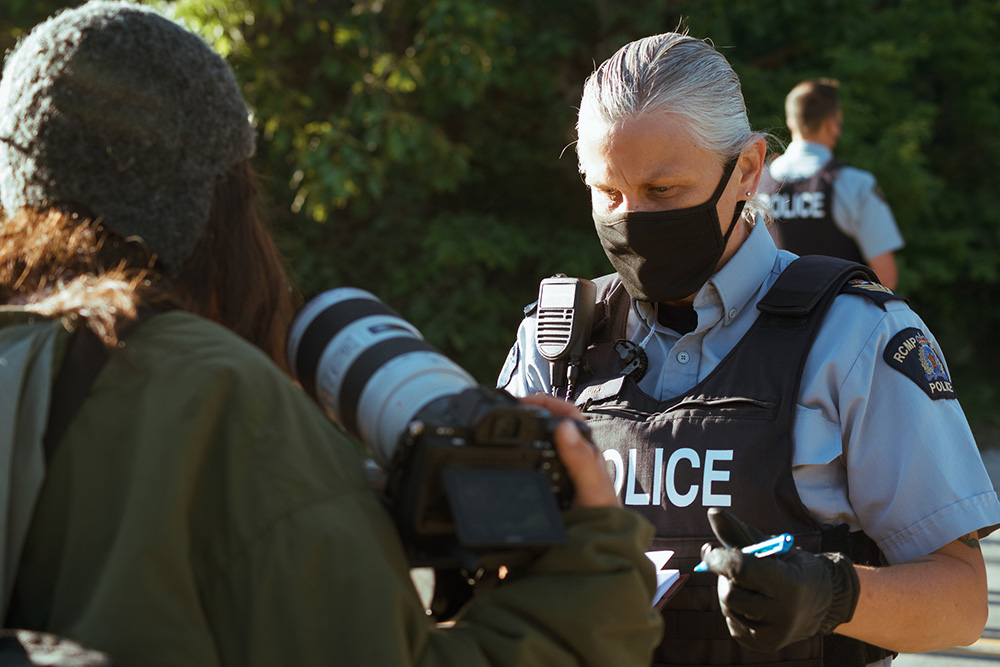B.C.'s Supreme Court delivered "precedent setting" comments last week slamming RCMP tactics at the Fairy Creek blockades against old-growth logging, according to legal experts. Justice Douglas Thompson laid out in sharp detail why the court found unlawful the force’s use of “exclusion zones” to place certain areas off limits to protesters, members of the media and observers.
The comments, which explain an oral decision delivered on July 20 and marks the first time a BC court has weighed in on the use of the practice, should rein in such methods, say legal experts.
Exclusion zones were used extensively during RCMP raids on Wet’suwet’en territory in 2019 and 2020.
“We’ve seen police relying on this practice of establishing exclusion zones more and more over the years, and this decision really reaffirms that we don’t live in a police state,” said Matthew Nefstead, a lawyer for the group Elders for Ancient Trees, which submitted the application. “It’s not up to the police to make all the decisions.”
But witnesses say that RCMP’s use of broad exclusion zones has continued in recent days.
On Monday, RCMP took over the Fairy Creek Blockade’s headquarters and blocked off roads limiting access to broad swaths of the region. They set up a gate near the entrance to headquarters and created exclusion zones on Granite main road and on Braden main road, on the way up to Waterfall camp on the opposite side of the Fairy Creek watershed from headquarters. The escalation began while the blockade was celebrating its one-year anniversary with a rally at the Victoria parliament.
Since then, exclusion zones within the region continue to limit public and media access, according to a camp spokesperson that goes by the name Willow.
“They're virtually breaking the law as I understand it,” said Bill Jones, a Pacheedaht Elder and a supporter of the blockades. “They seem to think that they can reinterpret the judge's orders to suit their purposes,” he said. “It’s an affront to our rights and freedoms.”
On Thursday, a photojournalist on assignment for Victoria Buzz was arrested while documenting RCMP enforcement, and other members of the media continue to report being blocked from viewing arrests. The next day, blockaders say police used pepper spray on 47 people attempting to walk through an exclusion line.
Witnesses also report having their vehicles and personal possessions apprehended and thrown away by RCMP. One blockader said witnesses observed RCMP apprehending a satellite dish which provided internet access to media and other blockaders.
On Sunday around 200 blockaders resisted the exclusion line, pushing it back down the mountain and re-establishing some “hard blocks,” — locking devices used in civil disobedience — that had been dismantled by police. The development came after a long week of setbacks for the blockaders.
Meanwhile, witnesses report that RCMP continue to confiscate blockaders’ food and water.
“They’re trying to starve us out,” said Rani Earnhart, a member of the Rainforest Flying Squad’s legal team, in a press conference on Friday, adding that denying public and media access and confiscating supplies is “in clear contravention of Judge Thompson’s orders, and could be considered contempt of court on the part of the RCMP.”
As the disconnect between the court's findings on RCMP power and their practice grows wider, questions about the power of the courts hangs in the balance, says Leo McGrady, a senior legal counsel with experience in civil disobedience.
“They're required to scale back very dramatically what they're doing,” he said, but added that “there’s still a huge amount of ambiguity” around RCMP’s discretion on how to enforce injunctions in the midst of changing circumstances.
But while the RCMP’s follow-through might be uncertain, Judge Thompson’s decision was clear, says McGrady, whose clients include The Tyee.
“They're acting illegally if they continue that conduct,” he said, “and it appears from the media reports that they may be doing just that.”
In an emailed statement to The Tyee, Sgt. Chris Manseau, division media relations officer for BC RCMP Communication Services, wrote that since receiving the judge’s oral decision on July 20, “we have made adjustments and conduct assessments on a daily basis on the location of those temporary exclusion zones and access control points to ensure we are aligned with the court’s direction to keep the two locations as close together as possible.”
Manseau added that since enforcement began in May, “the public have had and continue to have access to the area. Although, there may be times where access was and will be delayed due to ongoing police enforcement.”
Suit filed by activist seniors
In April, Elders for Ancient Trees filed an application to the court arguing that the RCMP were overstepping their rights through the use of exclusion zones. On July 20, the judge issued a two minute-long oral decision clarifying that the RCMP’s use of exclusion zones to date had been unlawful.
Last Monday, the courts explained why.
It stated that the injunction filed by logging company Teal-Jones gave RCMP the power to arrest those breaking the law, but not to prevent laws from being broken. That means that broad exclusion zones that seek to prevent future actions are illegal.
While the judge acknowledged the RCMP’s rights to enact small, short-term exclusion zones while making arrests and to limit access to crime scenes to protect evidence, the judge clarified that the RCMP’s actions — including barring public vehicle access, establishing checkpoints barring entry from kilometres of land, limiting media access to arrests and maintaining those limits for extended periods of time, constituted a breach of the injunction.
“I conclude that the RCMP have adopted an overbroad interpretation of the enforcement clause in the order,” wrote Judge Thompson in his comments.
Thompson couched his ruling in the constitutional rights of individuals “to be left alone by the state,” which he described as “central to my analysis of the scope of police power in relation to the injunction.”
Nefstead said Thompson’s constitutionally grounded rationale is important, clarifying the RCMP’s duty to uphold individual liberties while enforcing the law.
The law “only works if essentially, if everyone's on board,” said Nefstead. “If the police are enforcing the law in a manner that's contrary to a court order, then that is repugnant to the rule of law, just as someone disobeying a court order would be.”
“I think that's a theme that runs through the whole decision,” said Nefstead, who thinks that constitutional rationale could be drawn on for future cases around RCMP practice. “It sets a strong precedent for the use of these kinds of exclusion zones in the future,” he said.
RCMP’s use of exclusion zones as a tactic to enforce injunctions against civil disobedience is on the rise, Nefstead said.
Broad exclusion zones were one of the hallmarks of the 2020 police raids on Wet'suwet'en territory enforcing an injunction by Coastal GasLink, where police restricted access to more than 60 kilometres within Wet'suwet'en territory, and barred community members from delivering supplies. “We have been prevented from accessing our territory,” said Sleydo’ Molly Wickam, a spokesperson for the Gidimt’en Clan, during a news conference in 2020.
After studying RCMP’s enforcement behaviour in protest situations over the last 30 years, McGrady sees a number of consequences that can arise from broad exclusion zones such as those imposed at Fairy Creek.
“The key feature of any act of civil disobedience is the actual arrest,” he said. When broad exclusion zones are in place, said McGrady, “that's not accessible to the media and therefore not to us,” the public.
McGrady adds that public and media presence builds police accountability. The veteran lawyer highlighted the successful class action lawsuit against RCMP enforcement during the G20 protests in Toronto in 2010, resulting in RCMP being disciplined for their conduct including the use of excessive force.
“None of that would have happened if people hadn’t been there filming what the police were doing.”
Courts as a growing battlefront
If the RCMP fails to comply with a Supreme Court decision, the blockaders have a few legal paths for redress.
One of the most accessible options is the RCMP’s Civilian Review and Complaints Commission, which provides a pathway for individuals and groups to submit their reports surrounding RCMP misconduct.
But the board has been unable to compel the RCMP to change their use of exclusion zones to date.
In 2013 the CRCC found that RCMP had overstepped in their use of exclusion zones at anti-fracking protests at Kent County, New Brunswick. The RCMP responded by indicating that its operations were already in line with the council’s direction. In a final report on the issue, the chief commissioner of the complaints process found no evidence that the RCMP had changed their practices.
During RCMP raids on Wet’suwet’en territory in 2020, the BC Civil Liberties Association and the Union of BC Indian Chiefs submitted a complaint, indicating that RCMP exclusion zones constituted “a serious violation of Indigenous Rights and jurisdiction.”
The complaints commission responded to that complaint arguing that another investigation wasn’t needed due to the council’s previous guidance on exclusion zones at Kent County.
In a press conference on Friday, Earnhart said media and blockaders had submitted over a dozen complaints filed by individuals.
“It’s a slow process and I don’t know that we’ve yielded any successes out of that.”
The other path goes directly through the courts. Instead of relying on the complaints commission, the blockaders say they will be submitting other court challenges in the days and weeks ahead.
“Discussions are underway,” said Kathy Code, another member of the Rainforest Flying Squad. “We have a number of legal challenges coming up.” ![]()
Read more: Rights + Justice, BC Politics, Environment
















Tyee Commenting Guidelines
Comments that violate guidelines risk being deleted, and violations may result in a temporary or permanent user ban. Maintain the spirit of good conversation to stay in the discussion and be patient with moderators. Comments are reviewed regularly but not in real time.
Do:
Do not: